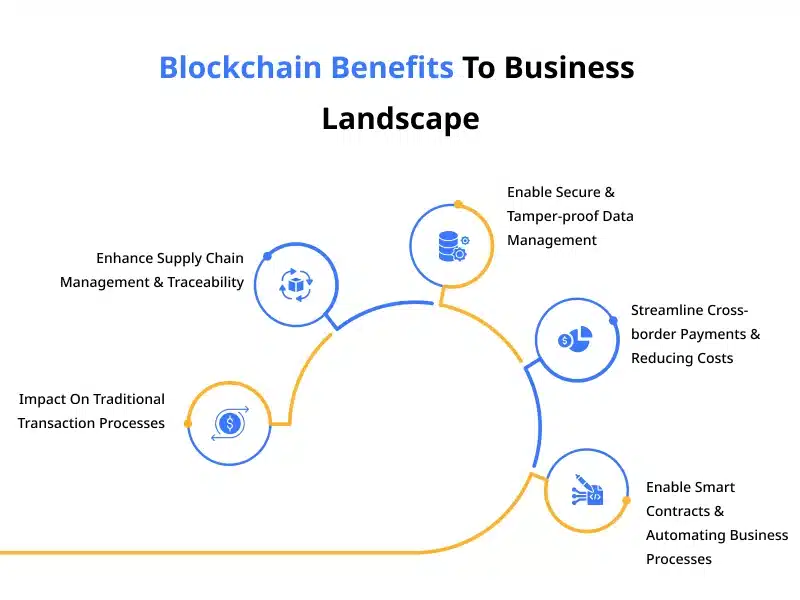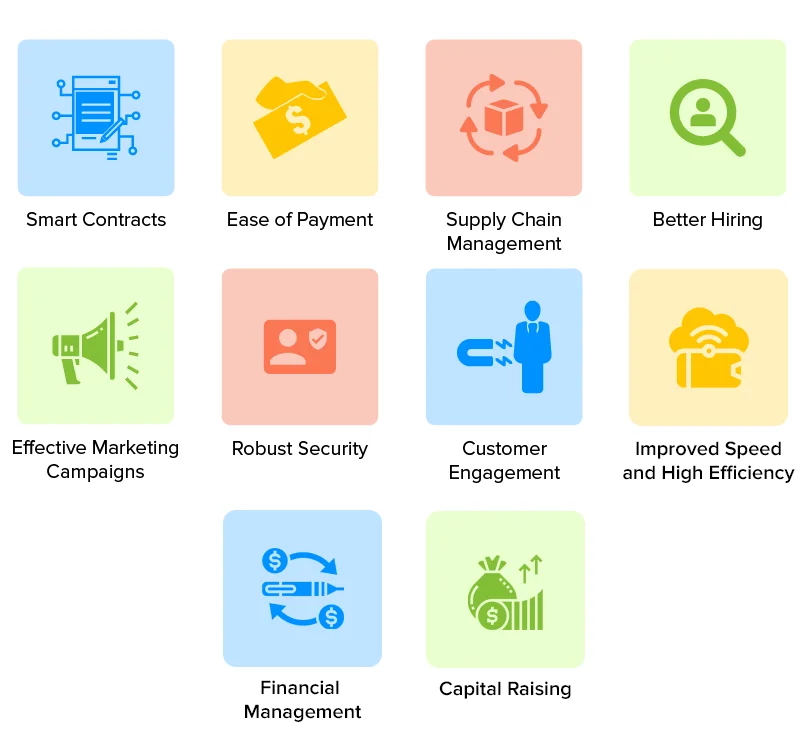
At its essence, blockchain is a decentralized, distributed ledger technology proficient in recording transactions across numerous computers. This creates a transparent, tamper-proof, and immutable transaction history, fostering trust and obviating the need for intermediaries. The technology assumes profound significance in the revolution of business operations, offering secure and efficient transactions, optimizing supply chain management, elevating transparency and accountability, and granting individuals control over their data.
In this blog post, we will delve into the transformative influence of blockchain on enterprise landscapes. We will discuss its impact on business operations and explore use cases demonstrating the transformative potential of this groundbreaking technology.
Key Components of Blockchain
- Blocks: A blockchain is an intricately linked chain of blocks, each brimming with a meticulously cataloged list of transactions or data entries.
- Decentralization: The hallmark of blockchain lies in its decentralized architecture, which prevents the need for a central authority or intermediary, fostering a peer-to-peer environment of trust.
- Consensus Mechanism: Blockchain’s fortitude relies on consensus mechanisms, such as the venerable Proof of Work (PoW) or the innovative Proof of Stake (PoS), to validate and authenticate transactions diligently.
- Cryptography: Cryptography serves as the unbreakable seal safeguarding transactions. This cryptographic armor ensures the sanctity of data and guarantees absolute privacy and authenticity.
How is Blockchain Transforming The Business World?

With its decentralized and secure nature, blockchain can transform various aspects of the business landscape. Let’s explore how blockchain drives these transformations and paves the way for an efficient and safe business ecosystem.
Impact On Traditional Transaction Processes
Blockchain eliminates the need for intermediaries and reduces transactional complexities. For instance, in the real estate industry, blockchain-based platforms like Propy enable direct property transactions, eliminating the need for brokers and reducing associated costs. Buyers and sellers can interact directly, ensuring transparency and reducing the time required for completing transactions.
Enhancing Supply Chain Management & Traceability
A study by Natural Products Insider shows that 94% of consumers prefer brands that provide product origin and supply chain transparency. Blockchain provides an immutable and transparent ledger, allowing businesses to track and verify the entire supply chain journey. For example, in the food industry, Walmart uses blockchain technology to trace its products’ origin, ensuring food safety and reducing the time required to identify and resolve issues in case of product recalls.
Enabling Secure & Tamper-proof Data Management
In a survey by CNBC, 67% of businesses reported data breaches and cyber threats as their top concerns. Blockchain ensures data integrity and security by creating a decentralized and tamper-proof database. MedicalChain, a blockchain-based platform, securely stores patients’ medical records. It allows authorized healthcare providers to access and update patient information seamlessly while maintaining privacy and security.
Streamlining Cross-border Payments & Reducing Costs
The World Bank estimates that reducing the cost of remittances by 5% could save $16 billion annually.
Blockchain technology facilitates faster and more cost-effective cross-border payments. Ripple, a blockchain-based payment platform, enables real-time settlement and reduces transaction fees. The technology benefits individuals and businesses in developing countries, allowing them to access affordable financial services and participate in the global economy.
Enabling Smart Contracts & Automating Business Processes
Smart contracts are self-executing contracts with predefined conditions stored on the blockchain. They automate business processes, eliminate the need for intermediaries, and ensure transparency. For example, Ethereum’s blockchain enables the creation of decentralized applications (DApps) that leverage smart contracts to automate tasks such as supply chain tracking, insurance claims, and royalty distribution.
Real-world Examples of Businesses Using Blockchain
- Finance: Blockchain is used to develop new financial products and services, such as instant payments, digital assets, and crowdfunding platforms.
- Healthcare: Blockchain is used to improve the security and efficiency of healthcare data management and develop new telemedicine and healthcare payment solutions.
- Supply chain management: Blockchain is being used to track the movement of goods through supply chains, ensuring that they are authentic and have been produced ethically.
- Real estate: Blockchain is used to streamline transactions and create new property ownership models.
- Government: Blockchain is being used to improve the efficiency and transparency of government services, such as voting, land registration, and tax collection.
Blockchain In Supply Chain & Logistics
Today, supply chains and logistics face the challenges of transparency and traceability. Enter blockchain, the game-changer. With its decentralized and immutable nature, blockchain brings revolutionary transformations.
- Immutable Transparency: Say goodbye to opaque supply chains! Blockchain enables end-to-end visibility, allowing stakeholders to track and verify every step of the journey.
- Streamlined Processes: Smart contracts, manual paperwork, and intermediaries have become relics of the past. Automate workflows, eliminate delays, and ensure prompt deliveries.
- Counterfeit Prevention: Counterfeit products can tarnish a brand’s reputation. Blockchain creates unique digital identities for products, ensuring authenticity and safeguarding consumers.
Blockchain-Based Identity Verification Systems
From online banking to e-commerce, verifying identities is crucial. Blockchain-driven identity verification systems revolutionize how we establish trust and protect sensitive information.
- Self-Sovereign Identity: Empower individuals to control their own digital identities. Blockchain securely stores personal data, allowing users to share specific information with third parties, boosting privacy and security.
- Efficient & Secure Authentication: Bid farewell to passwords and centralized authentication systems. Blockchain-based identity verification offers decentralized, tamper-proof authentication, protecting against identity theft.
- Streamlined KYC Processes: Know Your Customer (KYC) procedures can be time-consuming and repetitive. Blockchain simplifies KYC, ensuring data integrity while reducing costs and enhancing customer experience.
Blockchain For Digital Rights Management & Intellectual Property
Protecting intellectual property and ensuring fair compensation is a challenge. Uses of Blockchain technology in business disrupt traditional models and empower creators:
- Immutable Copyright Protection: Blockchain creates a permanent record of ownership and timestamps creative works. Say goodbye to disputes and hello to a transparent and accountable ecosystem.
- Smart Contracts for Royalties: Artists and content creators can automate royalty payments using smart contracts. Instant, transparent, and fair compensation ensures a thriving creative economy.
- Licensing & Collaboration Made Easy: Blockchain simplifies licensing processes, enabling seamless collaboration between creators and businesses. Unlock new opportunities for innovation and growth.
Blockchain In Healthcare For Secure Medical Records
Medical records contain sensitive and private information. Blockchain in healthcare introduces a paradigm shift in healthcare data management.
- Enhanced Data Security: Blockchain secures medical records with encryption, decentralization, and consensus mechanisms, reducing the risk of data breaches and unauthorized access.
- Interoperability & Data Exchange: Enable seamless and secure sharing of patient information between healthcare providers, improving diagnosis accuracy, treatment efficiency, and patient outcomes.
- Patient Empowerment: Blockchain enables patients to own and control their health data, granting them access and the ability to share records securely. Empowered patients drive personalized care.
Challenges of Traditional Business Model and its Solutions

Traditional transaction processing systems are often inefficient, insecure, and lacking in transparency. For example, a bank transfer can take several days to process, and there is always the risk of fraud. Similarly, supply chain management systems can be complex and opaque, making it difficult to track the movement of goods and ensure that they are authentic.
Blockchain technology solves the challenges of traditional transaction processing systems by providing a secure, transparent, and tamper-proof way to record and process transactions. Blockchain is a distributed ledger technology, which means it is shared across a network of computers. This makes it very difficult to hack or tamper with blockchain data.
The benefits of using blockchain for transactions include:
- Increased efficiency: Blockchain can significantly reduce the time and cost of processing transactions. For example, a blockchain-based payment can be processed in seconds rather than days.
- Improved security: Blockchain is highly secure, making fraud or tampering with data difficult.
- Enhanced transparency: Blockchain transactions are transparent and verifiable, which can help to build trust and reduce disputes.
What’s the Future of Blockchain in the Business World?
When discussing the future of Blockchain technology, it has unparalleled potential to introduce new ideas and concepts into existence, integrate the existing ones, and make great sense of everything prevailing in the market. For instance, blockchain is revolutionizing the real estate industry, allowing stakeholders to conduct transactions securely and removing intermediaries.
The technology, just like Silicon Valley, comes with promises confined only to the imagination and efforts of the entrepreneurs and application developers existing/entering this field. That implies that the role of blockchain for small business and large business applications depends utterly on how much we harness its potential in our business economy.
Final Words
Blockchain technology is the lodestar guiding businesses towards a new epoch. It doesn’t merely offer solutions to long-standing challenges. It is the compass leading the way to a business landscape that champions transparency, security, and efficiency. As more industries embrace this transformative decentralized ledger technology, the journey continues to be marked by dynamic and exhilarating possibilities. The transformative potential of blockchain in business is not a static concept. It’s a dynamic and evolving field that will continue to shape the future of business in unprecedented ways.
advansappz emerges as a pioneering force in the blockchain for enterprise transformation. It seamlessly integrates cutting-edge solutions. Their innovative applications harness the power of blockchain, offering businesses enhanced security, streamlined processes, and unprecedented transparency. Through advansappz’s contributions, enterprises experience a paradigm shift, leveraging blockchain’s potential to elevate operations and thrive in the dynamically evolving business landscape.
Frequently Asked Questions
Blockchain is a decentralized and distributed ledger technology that records transactions across a network of computers. It operates on a blockchain, each containing a list of transactions. The system is designed to be transparent, tamper-proof, and immutable.
Blockchain ensures security through its decentralized nature and cryptographic algorithms. Transactions are recorded in a way that makes it extremely difficult for any single entity to control or manipulate the data. This decentralized and cryptographic structure enhances the security of business transactions.
Smart contracts are self-executing contracts with the terms of the agreement directly written into code. They automate and enforce the terms of a contract, reducing the need for intermediaries. This automation streamlines business processes, making them more efficient and less prone to errors.
Blockchain brings transparency and traceability to supply chain management. It allows for the real-time tracking of goods and transactions at each stage of the supply chain. This transparency reduces fraud, errors, and inefficiencies, making the supply chain more reliable.
Blockchain enables individuals to have greater control over their data by allowing them to manage access permissions. Through decentralized identity systems, individuals can grant and revoke access to their data as needed, enhancing privacy and putting individuals in control of their information.












